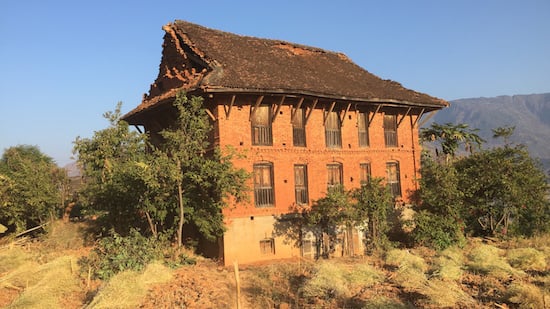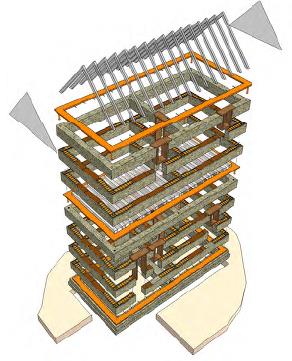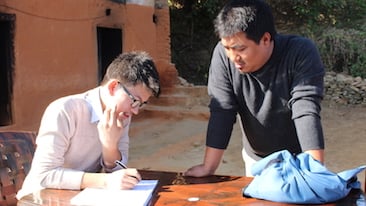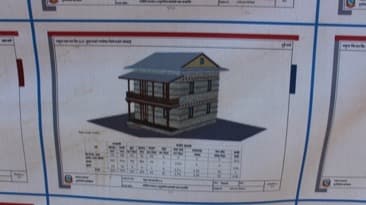Resilient Housing
After the 2015 earthquakes, FONA committed to supporting communities to rebuild their lives. Recognising that one of Nepal’s inherent assets is its beautiful environment, we sought out a solution for rebuilding houses that would improve resilience and respect the vernacular of the build environment. The emphasis of our work is on capacity building and strengthening communities, by developing the knowledge and skill base around resilient, sustainable construction methods and restoring confidence in locally available materials.
The need for a stronger foundation
As aid agencies began to distribute tin sheets and temporary shelters were erected, what became clear was the need for a more long term, strategic approach to reconstruction.
FONA spoke to local communities and identified three key practical challenges:
- REMOTENESS
People living in rural areas typically do not have access to new materials, nor can they afford the cost of bringing new materials to their village. They will have to re-use the materials recovered from the house that was destroyed.
- TECHNICAL KNOWLEDGE
People want to return to their homes but are afraid of rebuilding houses where they fell down. They don't know if their land is safe to rebuild on, or how to rebuild their homes safely.
- AFFORDABILITY
People lack the resources - money, materials and labour - to rebuild their homes, they cannot afford new or alternate materials or construction methods that are more earthquake resilient.
KEY PROGRAM PRIORITIES
From this consultation, we identified three key priorities for the program:
- Building traditional, more resilient houses.
- Providing support to build upon Nepalis own high standard of knowledge and skills in this area.
- Give families the opportunity to access information and skills training that can help them regain their livelihoods.


PROCESS
1. CAPACITY BUILDING FOR A TRANSFORMATIVE APPROACH
A key aspect of our vision is to bring together diverse expertise and local input to regenerate and transform communities. To implement our resilient housing project, we are working with expert engineers, architects, NGOs and local communities to plan and implement the rebuilding initiative.
To us, it was important to ask the communities how they wanted to rebuild, and to then collaborate with experts in order to make that future possible.
FONA is providing support to families to determine where to rebuild and how to improve the safety of their housing design and offering them the opportunity to develop a practical and valuable skillset for sustainable housing.
Training programs will focus on how to safely re-use valuable building materials such as stones, mud mortar, timber beams, roofs, windows and doors recovered from houses that were destroyed, as most people cannot afford new, alternative materials.

2. BUILDING HOMES NOT HOUSES
The resilient housing project introduces modern engineering techniques to make the traditional village house safer, but it also preserves the character and dignity of local culture. When asked, villagers wanted their own homes back. We want to restore confidence in local materials, and with simple but effective engineering techniques to enable people to build stronger homes that still maintain cultural heritage and value.
Unlike emergency relief efforts, involving hastily assemble concrete and iron shanty houses, the aesthetic value of our houses is also very important. We want to provide the best resources and support so that Nepali people can regenerate what was lost, improving their homes using a mix of modern and traditional building techniques.
3. ENSURING EQUITABLE ACCESS TO TRANSPORT
During the initial stages of humanitarian aid distribution, the OHCHR reported that temporary shelter and housing repair support was not reaching rural areas such as Sindhuli despite these being among the worst affected. This is mainly due to the distance from the city, remoteness and relative inaccessibility by road. For this reason, FONA’s resilient housing project will focus on these hill areas to the east of Kathmandu.



Setbacks in the reconstruction effort
Delays in the formation of Nepal’s reconstruction authority, and the delayed provision of government grants have impacted the commencement of rebuilding efforts. We remain determined to ensure that any support we provided is consistent with government standards so that community members they can access these valuable government subsidies.
Given the government roadblocks in housing reconstruction and grant distribution throughout 2015 and 2016, we are focusing on rebuilding school classrooms and our Education Centre of Excellence master planning and pre-construction phase.
We are aiming to start rebuilding houses in Sindhuli district in 2017 and we expect the reconstruction phase will continue over many years as we work with local communities who require assistance.
For donors who wish to sponsor a particular village project, we can help you become part of the reconstruction. We encourage opportunities to build mutually beneficial relationships between local communities and the international community.
Please send us an email for more information about supporting reconstruction efforts [email protected] or donate here to support projects like this.